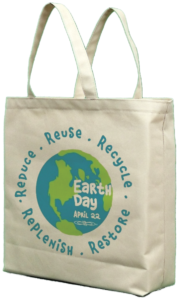It seems like, these days, people are jumping on the “let’s get rid of swag” bandwagon. I’ve been seeing posts left and right about how swag – or any type of branded merchandise – is simply wasteful. People gathering their torches and pitchforks, ready to tear down the promotional products industry. There is even a group a C-level executives who have started the #GAGtheSWAG campaign, in an effort to “decrease the use of unnecessary swag and thereby to cut the carbon footprint produced by conference swag, reduce waste, and encourage meaningful conversations with vendors at conferences.” Apparently, they have never received an interesting promo product that has started a conversation between consumer and supplier. Maybe they should check into multi-functional swag for something that will start a conversation.
Most recently, The University Star, which is a student newspaper through Texas State University, has proclaimed that “advertising on campus is ineffective and wasteful.” According to Naomi Wick, writer of this particular article, students eagerly search for alternate routes to avoid being bombarded with papers and other advertising products. The campus also deals with a massive amount of littering because students are politely taking flyers and then later tossing them or shoving them into backpacks. Her solution is, of course, boycott. She states, “It’s only when enough people refuse these useless objects that large companies realize they’re wasting time and money in ordering the promotional merchandise and begin to taper down how much they buy.”
Here’s the thing – promotional products, in and of themselves, are not a negative. In a recent study, Promotional Products Association International discovered the following:
- 9 out of 10 people were able to recall the branding of a promotional product; 8 in 10 also recalled the message.
- 82% of consumers had a more favorable outlook of the company after receiving a promo product.
- Promotional items are ranked the #1 most effective form of advertising across all generations.
This idea of turning swag into a dirty word is dangerous. Why? Because absolutes are dangerous. Banning swag – whether on campuses or at conferences – is removing the top advertising medium that companies can utilize. There’s a difference between swag and wasteful swag. All companies have the capability to be more responsible in promotional advertising. Of course, this is where promo gurus, like ourselves, come in. If an organization has a desire to be legitimately purposeful in how they buy promotional products – including flyers, like at TSU – distributors exist to help make that buying process align with the group’s goals.
Worried about too many flyers being printed? Find out how many people you are targeting and only print enough for that number of people. You can always print more when you start running low. Concerned about papers filling landfills? Maybe, instead of paper, print your message on a seeded card. These are not only a more unique form of advertising, which will grab people’s attention, but are also less likely to be thrown into the bottom of the backpack. And, as with the best items of swag, it can be used. Just pass out these seeded cards and watch students plant them, providing a beautiful landscape all over campus.

If you want to do something about wasteful swag, then go for it! Be resourceful, get creative, and focus on eco-friendly options. Even ask your distributor which products are least likely to be discarded. It’s in our job description to help you with these kinds of dilemmas. Labelling swag as this evil entity does not benefit anyone – including the consumers who enjoy the freebies! Do your part in promoting mindful purchases and let others see the positive effects of doing so.



